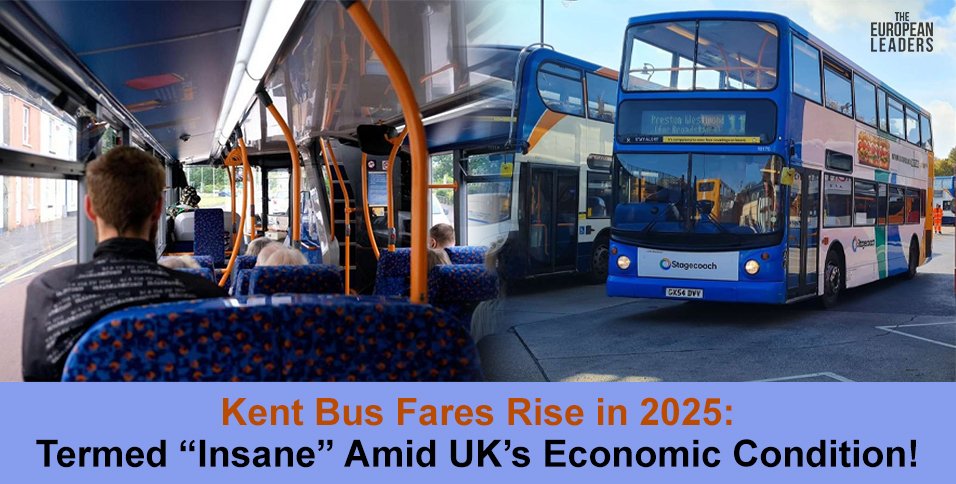The European Leaders
31 December 2024
Kent – The Kent Bus Fares Rise has ignited a heated debate among passengers, public officials, and transport operators. Stagecoach, Kent’s largest bus operator, has announced fare hikes, citing a 26% surge in operational costs. The decision includes controversial changes such as the elimination of the widely-used “kid-for-a-quid” scheme and higher costs for school travel passes, placing additional strain on families.
The Breakdown: What’s Changing?
- Fare Increases Across the Board
- Single Fares: Rising from £2 to £3, marking a 50% increase.
- Family Travel Costs: For instance, a round trip from Canterbury to Herne Bay now costs £6 instead of £4.
- Student Passes: The Kent Travel Saver ticket for secondary school students increases by 20%, from £450 to £550.
- Service Adjustments
- Popular discounted options like unlimited daily travel for children are being discontinued.
- New tariffs for short, medium, and long journeys range from £1.80 to £3.
Public Outcry: “Insane and Unsustainable”
Critics have labeled the fare hikes as “extortionate” during a cost-of-living crisis. Commuters argue that the increased prices will deter bus usage, pushing more people toward cars—a shift at odds with environmental goals.
“Families are being priced out of public transport, which should be accessible and affordable,” noted a local council representative.
Why Are Fares Increasing?
The fare hikes are deeply tied to rising operational expenses and the broader UK economic climate:
- Operational Pressures: Higher fuel costs, staff wages, and maintenance expenses are driving up costs.
- Government Fare Cap Adjustment: A national policy change raised the maximum single bus fare cap from £2 to £3, aligning with inflation but significantly impacting passenger pockets.
Despite these challenges, Kent County Council has received over £35 million in government funding since 2022 to improve bus services. Critics argue that this funding has failed to offset the financial burden on passengers.
Wider Economic Context
The UK’s economic slowdown exacerbates the issue. Stagnant growth, rising inflation, and increased household costs have left commuters with less disposable income. While public transport has traditionally been a cost-effective alternative, the Kent Bus Fares Rise risks pushing residents to more expensive and less sustainable travel options.
A Call for Balance
Transport operators defend the hikes as necessary to sustain services, but passengers and community leaders urge for reconsideration. Proposed solutions include:
- Extending subsidies for essential routes.
- Reinstating affordable family travel schemes.
- Introducing targeted support for students and low-income households.
The Road Ahead
The Kent Bus Fares Rise serves as a stark reminder of the challenges faced by public transport systems amidst economic turbulence. For now, Kent’s commuters are left weighing their options—and their wallets—as they navigate the rising costs of everyday travel.
Will these fare increases drive meaningful change in operational sustainability, or will they further strain an already burdened public? The answer may shape the future of public transport not just in Kent but across the UK.








